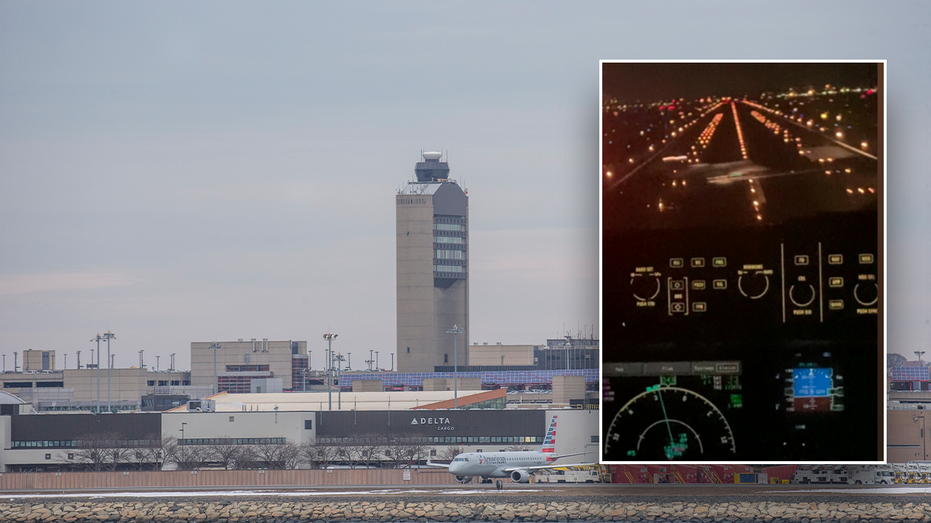A commercial airline pilot revealed to Fox News Digital what he believes is the reason for an uptick in close-call incidents involving aircraft in the U.S., and what must be done to fix the country’s travel system.
According to data from the Federal Aviation Administration (FAA), there have been 1,583 close-call incidents in fiscal year 2023 versus fiscal year 2022, which had 1,730 such incidents.
A letter to Transportation Secretary Pete Buttigieg on Sept. 5 from the House Oversight Committee stated that recent close-call incidents have “eroded the public’s confidence in air and rail safety and necessitates thorough investigation.”
The letter went on to list multiple rail and air travel incidents.
Here are a few examples of recent close-call incidents:
Pictures released by officials show the cockpit of a JetBlue plane on Feb. 27, which came extremely close to a Hop-A-Jet plane during landing.
The Boston air traffic controller instructed the charter pilot to line up and wait on the runway while JetBlue Flight 206 was cleared to land.
However, a National Transportation Safety Board (NTSB) report found that the Hop-A-Jet didn’t follow directions, forcing the Jet Blue aircraft to take measures to avoid a collision.
“HPJ280’s flight crew read back the controller’s instructions to [line up and wait], however they began the takeoff-roll instead,” the report said. “The airport surface detection equipment, model X (ASDE-X) alerted, and the controller issued go-around instructions to JBU206.”
More recently, on July 23, another close-call happened between an Allegiant Air flight and a private jet near Fort Lauderdale International Airport in Florida.
A spokesperson for the FAA told FOX Business in a statement that Allegiant Air Flight 485, an Airbus A320, took evasive action on Sunday, July 23, after the pilot received an automated alert about another aircraft at the same altitude.”
“An air traffic controller in the Miami Air Route Traffic Control Center had instructed Flight 485 to turn eastbound at an altitude of 23,000 feet when it crossed in front of a northbound Gulfstream business jet,” the FAA spokesperson said. “The pilot of the Gulfstream also took evasive action after receiving a similar alert.”
The Allegiant Air flight returned to Fort Lauderdale International Airport after the incident, where a flight attendant was treated for injuries, the spokesperson said.
Jerrica Thacker, who was on the flight, told Fox News Digital in an earlier interview that “It honestly felt like a roller coaster.”
“We all suddenly moved up, which to us felt like we moved down,” Thacker said. “I was too scared to move.”
Thacker said two flight attendants fell to the floor while handing out drinks when the close call incident happened.
Perhaps the most concerning recent close-call incident involved a FedEx flight and a Southwest Airlines flight that came within 100 feet of each other on Feb. 4 at an airport in Austin, Texas.
Jennifer Homendy, chair of the NTSB, told The Wall Street Journal that “FedEx was right over that Southwest plane at one point and they were both going down the runway, with one over the other.”
The Southwest Airlines flight was trying to take off while the FedEx flight was cleared to land. The FedEx flight quickly climbed while the Southwest flight took off, avoiding a potentially deadly incident.
Capt. Dennis Tajer, communications chair and spokesperson for American Airlines pilots labor union Allied Pilots Association, told Fox News Digital that the air travel system in the U.S. is under “immense pressure,” adding that individuals who are “less seasoned” and “less experienced” are now entering the industry.
Tajer said airline management teams are facing pressure to “fly as many airplanes, as much as possible,” adding that the FAA is understaffed, as are the air traffic controllers at many airports with the same issues of understaffing and less experience.
“It’s got all the ingredients for these incidents,” Tajer said. “We have just got to ensure that we stop this bad momentum. And none of these lead to accidents. It’s going to take a lot more than words and meetings. It’s going to take some actions and some real changes in the way the industry tries to operate post-pandemic.”
Dr. Hassan Shahidi, president and CEO of the Flight Safety Foundation, told Fox News Digital that the most serious close-call incidents are statistically “very rare.” He, like Tajer, said staffing issues play a factor in these incidents.
“We have our pilots are trained [sic] and do their jobs very well. But certainly when you have staffing capacity issues, that could certainly translate into issues such as fatigue, for example, that may impact performance. And certainly that’s one of the factors that investigators are looking at,” Shahidi said.
The National Aeronautics and Space Administration keeps a database with confidential safety reports made by pilots, air traffic controllers and others.
According to a New York Times report, the number of voluntary submissions involving close calls has more than doubled over the past decade with 300 incidents involving commercial airlines in the past 12 months, but doesn’t say if the increased figure is a result of an increase in such incidents or more frequent reporting.
In one 2021 incident reviewed by Fox News Digital through the database, a commercial airline pilot reported that after landing, they were instructed to cross a runway. When they began to make the turn to cross the runway, they noticed another aircraft and “abruptly stopped.”
“This was a very close call. Also, with my abrupt stop, people could have been hurt. Maybe Ground Control could have made sure that the both aircraft were aware of each other,” the pilot wrote in the database.
In a comment to Fox News Digital, an FAA spokesperson said, “One runway incursion is too many. Reducing surface safety risk remains a top priority for the FAA.”
The spokesperson also referred to a webpage showcasing what the FAA is doing to minimize close-call incidents, such as making more technology available that would reduce close-call incidents.
























